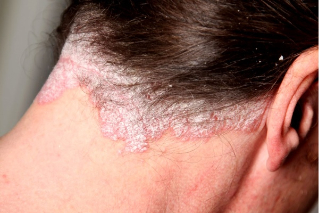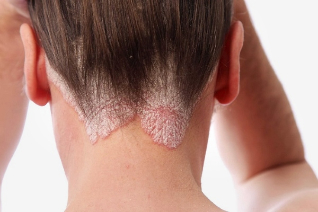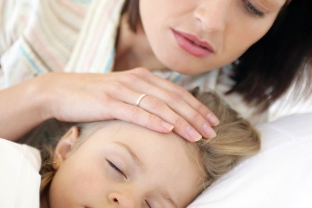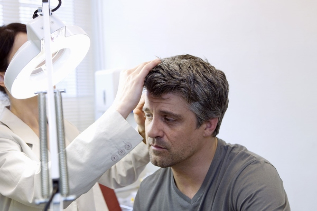Psoriasis is the sebum non-communicable a disease that occurs in 1 person out of 100, and in 80% of cases revealed a defeat of the scalp. It manifests itself in the form of the formation of atherosclerotic plaques or spots, between which is visible intact skin. The inflammation may extend and unite them. Why do you get psoriasis and how is it treated, know on.
Summary of the pathology

Psoriasis on the head - it is an autoimmune disease. Such a conclusion of the doctors was done after that, in the context of research in platelets, they have identified a characteristic of the autoimmune disease of change, and treatment overwhelming, the immunity of the medicines has made it far easier to the general state. This disease is not transmitted by the patient to a healthy person.
Psoriasis can affect anyone, but the clinical experience allows the highlighting of the main risk groups. Thus, the more often a pathology that affects women and is genetically inherited from the form makes itself felt already in the 15-25 age bracket. Sick of more than 50% of cases have relatives with psoriasis one form or another. This means that the risk of facing this pathology is higher among those whose parents or brothers and sisters also have such a diagnosis. Scalp psoriasis is usually can hit sites:
- separations;
- the upper part of the front;
- the area behind the ears;
- the whisky;
- the back of the head;
- the skin on the ears, including the ears;
- the arches of the eyebrows.
In general, psoriasis is made up of current character, it involves alternating periods of improvement and of the phases of exacerbation. On the infested areas of red appear in the form of a plate with a fat content is periodically peel and cause itching. Similar to an inflammatory process does not result in serious consequences for the health, but is at the origin of severe psychological problems. Very often there is a vicious circle, when the psoriasis causes stress, and it in turn becomes the cause of complications of the flight of the pathology.
The disease itself does not cause hair loss, but hair loss may lead to some methods of therapy, stress and / or damage to the skin. Usually, hair regrows after the skin cleaning and stabilization of psychoemotional state.
Why?

Doctors, until now, has not identified the exact causes that cause inflammatory reactions and overfishing, and the synthesis of the skin cells on the body of the patient. At this stage, the main hypothesis is genetic. It stipulates that individuals an innate predisposition to an acceleration of the upgrade of the keratinocytes (the cells of the epidermis of the human skin). In the event of psoriasis such inclination causes a specific reaction in the immune system:
- The body begins to accelerate to produce new cells, forming psoriatic plaques.
- Occurs more active the inflammation of the skin in the affected area (the body perceives as a thing alien).
- The more injured of the skin under the influence of immunity, all the more causes a division of the keratinocytes.
Since a long time, the genetic factors may remain in a latent state, but awake under the influence of unfavorable factors. These include:
- The stress. The changes in the nervous system become the cause of the violation of all the organs, including the skin. As a result, it causes changes in the division of epithelial cells.
- Injury to the skin. They cause failures in the process of division and growth of keratinocytes.
- The infectious diseases. The germs attack the immune system of the human being, especially if the disease is chronic. As a result, the immunity is always present in the effort and begins to attack the epithelial cells.
- The drought and the sensitivity of the skin. In this case, the skin is often suffer from repetitive strain injuries, and therefore a high probability of development of psoriasis.
- The climatic conditions. During the dry and the cold air of the skin is reinforced with a load, it is possible, therefore, to its violations, which lead to psoriasis.
- Diseases of the endocrine system. They become the cause of failures in the production of melatonin and lead to the endurance of the secretion of the growth hormone.
Another popular hypothesis states that the psoriasis develops due to the violation of the metabolism. In this case, the body is particularly sensitive to stimuli, from the reading to divide the cells of the dermis. If the rate of the skin is updated in a period of 3 weeks, in patients, it arrives in 5 days, which focuses on the head pop out of the blister pack. In this case, cause the aggravation can these factors:
- the wounds of the skin of the head;
- emotional burnout and stress;
- violations of substantive hormonal;
- diseases of the endocrine system;
- bad habits (smoking, alcohol abuse);
- the infectious disease process in the body;
- a poor diet;
- taking certain medicines;
- hypothermia, or prolonged exposure to the cold;
- the use of poor-quality care products of the skin of the head.
In some cases, the pitcher of departure for the development of psoriasis can become a condition of the immune system, which may occur as a result of stress or have suffered from an infectious disease.
Revealed that hiv-positive people suffer from psoriasis are 3 times more often than people in good health.
As the pathology is manifested?
Psoriasis develops gradually, and you can identify the different stages of the following processes:
- On the surface of the skin appear pink rash, which have a rounded shape, and the top covered with numerous patches of white color.
- The eruptions gradually multiply and increase in diameter. Finally, they are transformed into tablets psoriatic plaques that cause itching and burning. After this starts with a strong inflammation.
- The fabric too is multiplying under the pressure of excess reproduction ectodermal cells, platelets, and accumulation of macrophages and lymphocytes. This leads to a thickening of the skin in the places of defeat and the education of the red spots in the area of hair growth.
- The patient experiences a general malaise, and weakness. He can jump the temperature of the body.
- The skin becomes more sensitive, painful and more dense. Little by little, it loses elasticity, becomes more and more rough and covered by plates which flake off quickly.
- When the combing of the skin of the head is covered with bleeding abrasions and cracks.
- Wafer gradually peel, therefore, in the hair, you can see huge layers, resembling dandruff.
- The itching becomes more intense and even do not give the man to do the chores as usual.
- A person is in the doldrums, or continuously for the breaks, the feeling of a great aesthetic discomfort.
- The pathology is spread through the skin of the head and other parts of the body.
In order to reduce the manifestations of psoriasis, necessary at the time of the first eruption on the head to consult a dermatologist, make an assessment and begin treatment.
Characteristics of symptoms in children

Psoriasis of the scalp of the child develops, just as in adults, the most often, the disease such symptoms:
- redness of the skin of the head, which is the same across the scalp;
- wet softening of the skin as in the medicine called maceration;
- peeling of the pads;
- the formation of clusters of plates on certain areas of the skin of the head.
In the younger child age group psoriasis often reminds the education of diaper rash. The disease develops quite slowly and is difficult to treat.
Classification of the pathology
Scalp psoriasis is categorized by two parameters: the shape and stage of development. It depends on them the appearance of the disease. Each parameter is considered separately.
The form
On the form of psoriasis is of two types:
- Easy. Manifests itself mainly on the head in the form of the unity of the lesions. Generally, the pads are small in size and are covered with thin plates.
- Heavy. Elements psoriatic appear on the entire scalp. Depending on the size of the blister pack and more, and the thickness, if it is easy to severity of the pathology.
Stage
The experts distinguish three stages of the pathology:
- Progressive. On the scalp of new eruptions. Generally, they affect the region on the path of the hair growth. On psoriatic elements appears to be peeling. Gradually the islets of acne can unite, forming large areas of lesions. If the phase occurs during a recurrence of the pathology, are already available elements apply to off-shoring, the so-called phenomenon of the Kebner.
- For the hospitalized patients. The inflammatory process is recorded, but no new breakouts. At this stage of the characteristic sag of the growth of the platelets and the lack of hyperemic bezel on the contour of the skin elements.
- Regressive. The decrease in the volume of eruptions, which indicates the effectiveness of the therapy. Little by little disappear available platelets, which are replaced by spots. The patient is no longer concerned about the flaking, itching, and other symptoms of the pathology.
The diagnosis

If there were eruptions on the skin of the head, you want to consult a dermatologist. Can possibly be done by consulting a specialist hair treatment (officia) and a beautician, who will help you to find shampoos and other care products. In the diagnosis of the disease plays an important role to identify psoriatic triad, composed of such phenomena, as:
- Stearic spots. Enhanced by the peeling and the pads are silver and look like stearin.
- Psoriatic arthritis (psa) film. If you remove the pads, they appears in the location glossy wet surface.
- The blood of the dew. When the combing plate appears to drip of points of bleeding.
These symptoms enable a diagnosis to be made already during the visual examination. By doing this, the doctor takes into account the data of the anamnesis, including he said the patient relatives of people with psoriasis. To confirm the diagnosis, the doctor may prescribe a biopsy (removal of contents with affected areas) and the planting of the flora to the exceptions for fungal defeat. In the case of the generalized form of psoriasis advanced waives analysis of the blood. During toxification of the body, it will show a high erythrocyte sedimentation rate (esr), and an increase in the number of white blood cells.
Therapy total
Scalp psoriasis requires a personalized treatment, which will help to relieve the unpleasant symptoms, and especially, to obtain a long phase of remission, as a form of pathology. For these purposes, often attributed to an overall therapy. Each component deserves special attention.
It aims to tackle the chronic inflammatory reactions and the formation of excessive keratocytes, because it is a pathological process, which are the basis of the disease. In the framework of the general therapy the doctor may prescribe the following medications:
- funds of immunotherapy non-specific (Pirogenala, ATP);
- the complex of vitamins;
- immunomodulators;
- aromatic retinoids (the étrétinate, Acitretin);
- cytostatic;
- corticosteroids;
- the solution Gemodeza for intravenous drip introduction.
The receiving cytostatics and corticosteroids is appropriate in the case of severe forms of psoriasis, and with great severity of the symptoms on the skin of the head. If the psoriasis is also complicated by the accession of infection, in the course of treatment, are fed antibiotics.
In the framework of the general therapy the doctor can also prescribe antidepressants. They need to reduce and eliminate the associated psoriasis problems psycho-emotional - depression, stress, vigilance and socialis of the phobia. In addition, these drugs can enhance resistance of the patient to manage the stress, reduce the frequency and severity of flare-ups of psoriasis on the bottom of the nervous tension, improve sleep quality. Some drugs have antihistamine action, it is, therefore, also help relieve itching.
























